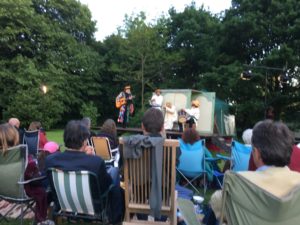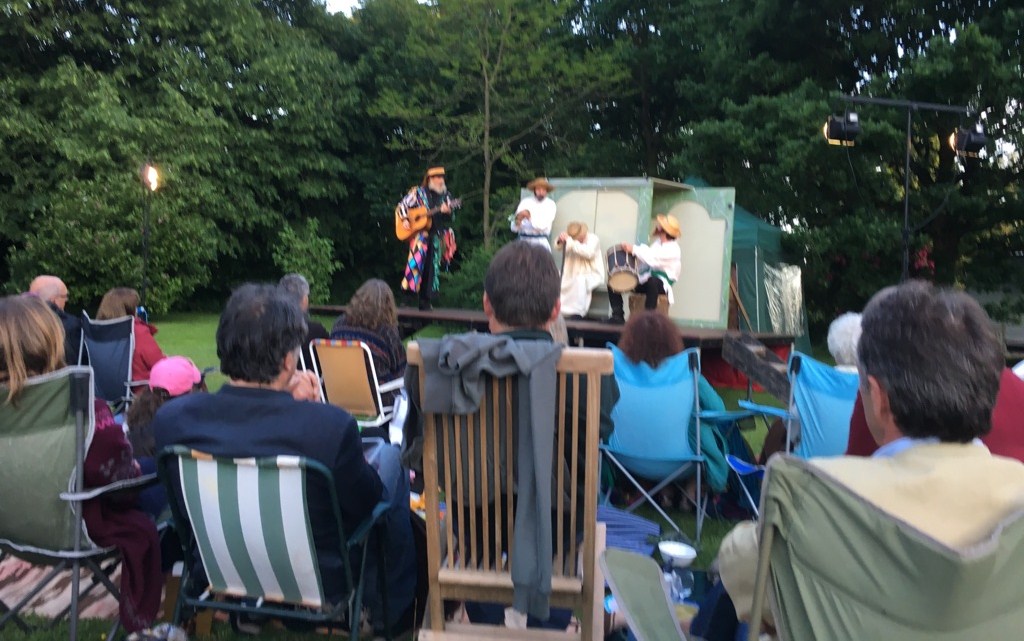14 June 2018
A Winter’s Tale
For a summer evening.
By Lynda Goetz
 If one were to go by the title alone, A Winter’s Tale would not seem the obvious play to stage as an open air summer production. However, for those who know the play, it is of course an excellent choice. This is the play known by many for its rather memorable stage instruction ‘Exit, pursued by a bear’, which in a funny way almost sums up this fast-moving late Shakespearean tale of friendship, jealousy, revenge and love, laced with heavy doses of folklore and comedy.
If one were to go by the title alone, A Winter’s Tale would not seem the obvious play to stage as an open air summer production. However, for those who know the play, it is of course an excellent choice. This is the play known by many for its rather memorable stage instruction ‘Exit, pursued by a bear’, which in a funny way almost sums up this fast-moving late Shakespearean tale of friendship, jealousy, revenge and love, laced with heavy doses of folklore and comedy.
The Festival Players are a group of young male actors, directed by old hand Michael Dyer (who is also responsible for publicity and programme design), who get together for a tour schedule lasting from mid-May to the end of August. Michael Dyer has been with the Festival Players since 2001, although the actors come and go. Each year a different Shakespeare play is chosen. Last year’s production was The Merry Wives of Windsor. The venues vary from village halls to grand houses or castles, from schools to care homes, and The Players roam all over the country from Cornwall to Scotland. They are even visiting the Netherlands and Norway this year too.
On a surprisingly warm summer evening we set off, complete with folding chairs, rugs and picnic hamper, for Cothay Manor, not far from Wellington, Somerset and the performance venue for the evening. Cothay Manor is a beautiful medieval manor with stunning gardens, which, by arriving early enough, we were able to visit before the play started. (I would thoroughly recommend a visit.) As we settled ourselves in, the young actors were busy setting up their simple stage (effectively trestle tables and a screen) – a set which would serve quite simply for all four acts and enable them to make their entries and exits (with or without bear) and to be sufficiently elevated above their audience to be easily visible even to those whose picnic chairs were several rows back.
 The play opens with two old friends, the King of Sicily (Leontes) and the King of Bohemia (Polixenes) discussing the return of the latter to his own country after a visit of nearly nine months. Leontes tries to persuade Polixenes to stay, without success. However, when he asks his pregnant wife Hermione to try her persuasive powers on him, she is successful. Leontes is suddenly jealous and suspicious and becomes convinced that she has been unfaithful to him with Polixenes. The rest of the story stems from this obsession. Watching a cast of male actors perform all the roles is fascinating and of course true to the original Shakespearean productions. Edmund Atrill as Hermione manages to be neither camp nor really feminine, but somehow portrays femininity whilst remaining resolutely masculine, as does, to a lesser extent, James Sygrove as the Lady in Waiting, Paulina. Will Gillham, as Paulina’s unfortunate husband, Antigonus, has the miserable job of abandoning Hermione’s baby and exits, not exactly pursued by a bear but with a ‘bear’ rearing up behind the screen in front of the trees forming the backdrop to the stage; which makes for a fairly effective transition to the later more folkloric and comedic elements of this play.
The play opens with two old friends, the King of Sicily (Leontes) and the King of Bohemia (Polixenes) discussing the return of the latter to his own country after a visit of nearly nine months. Leontes tries to persuade Polixenes to stay, without success. However, when he asks his pregnant wife Hermione to try her persuasive powers on him, she is successful. Leontes is suddenly jealous and suspicious and becomes convinced that she has been unfaithful to him with Polixenes. The rest of the story stems from this obsession. Watching a cast of male actors perform all the roles is fascinating and of course true to the original Shakespearean productions. Edmund Atrill as Hermione manages to be neither camp nor really feminine, but somehow portrays femininity whilst remaining resolutely masculine, as does, to a lesser extent, James Sygrove as the Lady in Waiting, Paulina. Will Gillham, as Paulina’s unfortunate husband, Antigonus, has the miserable job of abandoning Hermione’s baby and exits, not exactly pursued by a bear but with a ‘bear’ rearing up behind the screen in front of the trees forming the backdrop to the stage; which makes for a fairly effective transition to the later more folkloric and comedic elements of this play.
Will himself has not been killed off however and he has to make a further appearance in the second half of the play as Autolycus, peddler and pickpocket, a role he performs with gusto and musical talent. Indeed all six of the actors have to play more than one character and all throw themselves into doing so with enthusiasm. Mark Spriggs, the most experienced of the team and who has toured with The Festival Players since 2015, was a suitably affable, then angry and finally repentant Leontes, as well as playing the equally affable, fatherly Shepherd who had the good fortune to find the abandoned baby Perdita (complete of course with some gold and trinkets to indicate her high birth). This does of course present something of a challenge in the final Act where all follow Perdita and Florizel (Polixenes’ son who had pretended to be a shepherd to become Perdita’s betrothed) to Sicily, but Michael Dyer’s adaptation of the original handles this and other necessary changes adeptly and neatly.
 The British climate does not lend itself very readily to open air theatre, as I wrote around this time last year after sitting through a very wet production of Twelfth Night by Folksy Theatre in Hestercombe gardens. However, whatever the weather, it has a charm and an appeal quite different from sitting in a formal theatre. On a balmy summer evening in a beautiful venue such as Cothay it makes for a great social or family outing, as evidenced by the various groups with children. It is also a wonderful way to be introduced to the works of Shakespeare, which for so many children are a completely foreign country, an alien world, as they are frequently introduced to them as dry texts, not the living performances they should be. The Festival Players encapsulate Shakespeare as it was meant to be performed. In the words of Michael Dyer in the programme, ‘the actor …. is a translator; he can use his skills and training to take the printed word off the page and bring it to life on the stage. If he can pull it off and engage, entertain and enlighten the audience with Shakespeare’s mastery of language, wit, humanity and story-telling, he can proudly join the line which started with Richard Burbage and his company at The Globe in the 1500s’. Do go and see them sometime over the next two and a half months if you get the chance. (They are even in London – Streatham Common – for a matinee performance on 8th July.)
The British climate does not lend itself very readily to open air theatre, as I wrote around this time last year after sitting through a very wet production of Twelfth Night by Folksy Theatre in Hestercombe gardens. However, whatever the weather, it has a charm and an appeal quite different from sitting in a formal theatre. On a balmy summer evening in a beautiful venue such as Cothay it makes for a great social or family outing, as evidenced by the various groups with children. It is also a wonderful way to be introduced to the works of Shakespeare, which for so many children are a completely foreign country, an alien world, as they are frequently introduced to them as dry texts, not the living performances they should be. The Festival Players encapsulate Shakespeare as it was meant to be performed. In the words of Michael Dyer in the programme, ‘the actor …. is a translator; he can use his skills and training to take the printed word off the page and bring it to life on the stage. If he can pull it off and engage, entertain and enlighten the audience with Shakespeare’s mastery of language, wit, humanity and story-telling, he can proudly join the line which started with Richard Burbage and his company at The Globe in the 1500s’. Do go and see them sometime over the next two and a half months if you get the chance. (They are even in London – Streatham Common – for a matinee performance on 8th July.)


